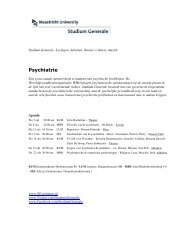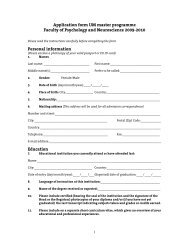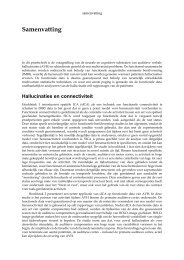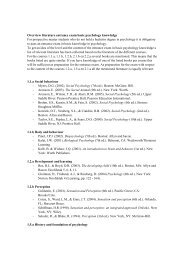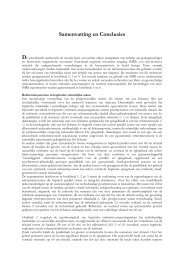Prospectus | 08/09 - Psychology and Neuroscience - Maastricht ...
Prospectus | 08/09 - Psychology and Neuroscience - Maastricht ...
Prospectus | 08/09 - Psychology and Neuroscience - Maastricht ...
You also want an ePaper? Increase the reach of your titles
YUMPU automatically turns print PDFs into web optimized ePapers that Google loves.
<strong>Prospectus</strong> Research Master <strong>Psychology</strong> 20<strong>08</strong> • 20<strong>09</strong><br />
conflicts that are involved in psychological research <strong>and</strong> clinical practice. Students will<br />
be introduced to the ethical <strong>and</strong> legal rules <strong>and</strong> boundaries in human research, <strong>and</strong> to<br />
the organizations <strong>and</strong> institutes supervising the application of these rules.<br />
112<br />
Psychologists always need to make sure that they carry out their work in an ethical<br />
<strong>and</strong> legally sound way. However, there is often a conflict of interests of the involved<br />
parties. In all circumstances, however, it is the psychologist’s primary task to secure the<br />
patients/participants welfare <strong>and</strong> to keep risks at a minimum. Therefore psychologists<br />
should know which ethical aspects are of importance <strong>and</strong> which laws <strong>and</strong> rules<br />
need to be applied <strong>and</strong> also which institutions supervise on the application of these<br />
rules. In addition, these aspects should be taken into consideration when writing <strong>and</strong><br />
submitting a research proposal to an ethical commission.<br />
The following topics will be discussed:<br />
• Examples of ethical <strong>and</strong> legal failings<br />
• Necessity of ethical <strong>and</strong> legal rules<br />
• Different guidelines: declaration of Helsinki, guidelines for Good Clinical Practice, etc.<br />
• Working with participants/patients: rights <strong>and</strong> duties, confidentiality, data processing<br />
<strong>and</strong> storage, etc.<br />
• Applying ethical <strong>and</strong> legal rules in e.g., protocol, case report form, informed consent, etc.<br />
• Ethical <strong>and</strong> legal reviews<br />
Instructional Approach<br />
Discussion groups, lectures.<br />
Form of Assessment<br />
Written assignment.<br />
| 496PP Epidemiology – 1 credit<br />
Coordinator: Marcus Huibers, Clinical Psychological Science (FPN), Phone 38 81487,<br />
40 Universiteitssingel East, Room 1.349, E-mail: m.huibers@DMKEP.unimaas.nl<br />
Description of the Course<br />
Epidemiology often is referred to as ‘quantative medicine’. In general, epidemiology<br />
deals with methodology issues in the field of health research, including mental health.<br />
Students in this workshop will be introduced to the principles of epidemiological<br />
research. Topics that are covered in the workshop include: frequency measures,<br />
association measures, sources of bias, validity issues, cohort studies, clinical trials,<br />
<strong>and</strong> systematic reviews. The theory of epidemiology will be studied <strong>and</strong> applied in<br />
interactive workshop sessions.<br />
Instructional Form<br />
Format of the workshop is a series of four 2-hour sessions <strong>and</strong> a final presentation<br />
session. Starting each session, the lecturer will give a 30-minute presentation of the





